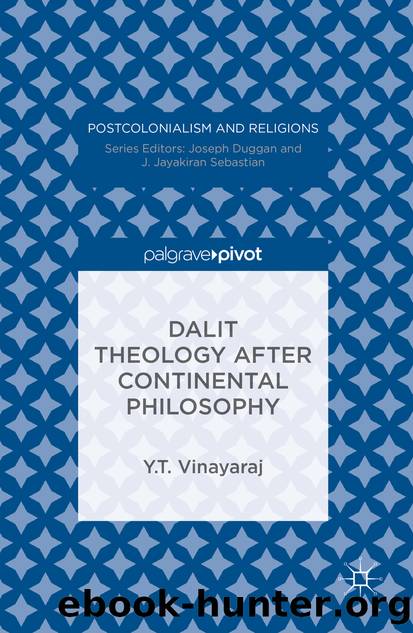Dalit Theology after Continental Philosophy by Y.T. Vinayaraj

Author:Y.T. Vinayaraj
Language: eng
Format: epub
Publisher: Springer International Publishing, Cham
Spivak and Postcolonial Theologies
Spivak has become one of the most important interlocutors for postcolonial theologians. It was the Spivakian theorization of the neocolonial Empire that provoked some theologians to de-colonize the Western theological imagination embodied in Christian Theology. The book Postcolonial Theologies: Divinity and Empire (2004) was an outcome of this desire. To introduce the book, the editors write: âWe use postcolonial theory in ways that commit us to something more than theoryâthat is, to an engaged and engaging theology, a work of resistance to the layered, ongoing, and novel colonizations of the planet.â 14 Stating that Christian theology suffers from an imperial condition, Catherine Keller signifies the imperative to attend to the excluded peopleâthe colonized otherâand their experiences in the theological program. Keller writes: âwith its [Christian Theology] imperial success, the church, one might argue, absorbed an idolatry of identity: a metaphysical Babel of unity, an identity that homogenizes the multiplicities it absorbs, that either excludes or subordinates every creaturely other, alter, subaltern.â 15 For Keller, one of the most important agendas for postcolonial theology is to interrogate the ontological identity of Western Theology and its Omni-God. Taking their cue from Spivak, postcolonial theologians focus on the transgressing space of âin betweenâ or âinterstitial spaceâ in which the power of hegemony is subverted and the colonial other is de-othered. According to Westhelle, this (non) space is alluring, dynamic and revealing where the subaltern âpreachesâ if not speaks. 16
In order to signify Spivak for a postcolonial theological imagination, Catherine Keller traces Spivakâs contentions with liberation theology. 17 According to Spivak, Christian theology does not exceed the âebb and flowâ of the power of Christianity as a âreligion.â 18 She upholds the view that Christianity like any other âgreat religionâ in the world is imbricated with power. Spivak interrogates the âother-worldly transcendenceâ and the âsuper-natural thinkingâ of (Western) Christian Theology. At the same time, she acknowledges the role of theology as a resource to engage in social analysis and political practice in the contemporary postcolonial context. 19 While signifying the role played by liberation theologies to envisage an ecologically just world, Spivak seems skeptical about their theological methodology, which is based upon âindividual transcendenceâ (as she calls it). She writes:Having seen, then, the powerful yet risky roles played by Christian liberation theology, some of us have dreamt of an animistic liberation theology to girdle perhaps the impossible vision of an ecologically just world. Indeed the name theology is alien to this thinking. Nature is also super-nature in this way of thinking and knowingâ¦Even super, as in supernatural, is out of the way. For Nature, the sacred other of the human community, is in this thinking, also bound by the structure of ethical responsibility. No individual transcendence theology, of being just in this world in view of the next, however the next is underplayed, can bring us to this. 20
Download
This site does not store any files on its server. We only index and link to content provided by other sites. Please contact the content providers to delete copyright contents if any and email us, we'll remove relevant links or contents immediately.
Christian Ethics by Wilkens Steve;(859)
Christian Ethics for a Digital Society by Kate Ott(779)
Fearfully and Wonderfully Made by Philip Yancey & Paul Brand(771)
God and the Multiverse by Victor J. Stenger(675)
Numbers by Ronald B. Allen(638)
How to Read Slowly by James W. Sire(615)
Christian Ethics: An Introduction to Biblical Moral Reasoning by Wayne Grudem(598)
The City of God by Saint Augustine & Marcus Dods(589)
Monastic Archaeology by Unknown(568)
Morality by Jonathan Sacks(566)
The Technological System by Jacques Ellul(547)
Amish Grace by Donald B. Kraybill & Nolt Steven M. & Weaver-Zercher David L(535)
Death of the Doctor by Unknown(526)
The Disabled Church by Rebecca F. Spurrier;(523)
Jesus: A New Vision by Whitley Strieber(521)
Children of Lucifer; The Origins of Modern Religious Satanism by Ruben van Luijk(513)
Critical Writings by Joyce James;(502)
Redeeming Sociology by Vern S. Poythress(488)
The Church in the Early Middle Ages by G.R. Evans(477)
